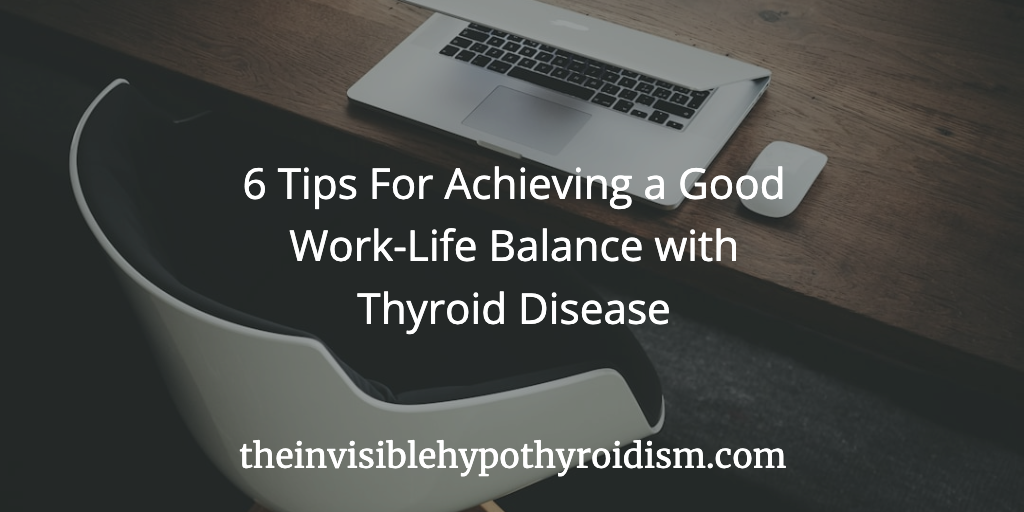Originally published on 7th3rdSeptember 2019 Last updated on 19th July 2024
I have written many times before, expressing the difficulties that many people with thyroid issues such as hypothyroidism and Hashimoto’s, face with remaining in employment.
As well as ensuring that you are on the right thyroid medication for you (which can really improve your quality of life and overall health), that thyroid levels are optimal and any other issues such as low vitamin levels and adrenal dysfunction are addressed, the below suggestions can also help you to achieve a good work-life balance when you have a thyroid condition.
What Does Work-Life Balance Mean?
Having a good work-life balance is defined as feeling as if you have enough time and energy to devote to both your work and your personal activities separately. Not having this balance right can lead to feeling stressed, anxious, overworked, as if you do not have enough time for your own personal tasks and activities and your physical health can also deteriorate as a result.
Juggling your hypothyroidism alongside working can feel difficult, especially if you have less energy levels than most people, doctors appointments to attend and need more time to recuperate outside of work.
Tip #1: Consider if Your Job is Right For You and Your Health
The most important consideration I have learned to take in to account in regards to working with thyroid disease, are the hours.
I’ve done shift work in the past, working for twelve hours straight, on my feet and without a break or sitting down. This kind of role is going to be a struggle at the best of times for someone with a thyroid condition. It’s a constant test and strain on the body and when you’re living with a chronic health condition, it’s even more so.
When looking for new jobs and opportunities, I have learned that I do best with 9-5 type hours, definitely not night shifts and definitely not long hours of work.
I have also moved from full-time to part-time work over the last few years or so, which has struck a much better balance with my health and personal life. Even though I am often considered to be very young to be working part-time hours already (although I am a parent, so I have childcare to juggle), I am no longer having to spend weekday evenings and weekends recuperating for the next week of work, now that I have time to actually enjoy some downtime and personal time. It has struck a much better work-life balance.
As well as your hours of work, looking at your line of work is also important.
If you’re doing something that physically drains you, leaving you no room to improve your health but instead is possibly even worsening it, you should really consider whether a less active or strenuous job would be better suited to your health.
Whilst no one wants to feel like their thyroid condition is ruling their life, by ignoring any signs that your job is actually worsening your health, you could drive yourself in to a worse state. It’s all about balance and listening to what works for you.
Tip #2: Use Your Holiday
I know many people who are guilty of not using their holiday allowance.
Holiday days can not only be used for vacations, but for catching up with friends and family, day trips, duvet days or getting some personal tasks done at home like gardening or finishing a project you started a while ago.
Not using up your holiday can certainly make you feel like your work-life balance is off.
Tip #3: Leave Work at The Office
You also need to be able to switch off from work, keeping plenty of time for yourself in the evenings and weekends (or whenever your non-work days are) for unwinding and enjoying your personal time.
When you can’t switch off from your role after leaving the office, this is a big warning sign that it’s threatening to harm your health. Not switching off is a threat to your sleep quality and cortisol levels, which, when raised over a prolonged period of time, is a recipe for disaster.
Avoid taking work home with you, checking emails outside of work hours and instead set firm boundaries. How can we expect to turn off from work and fully enjoy our personal time if we don’t?
Tip #4: Ensure You Take Proper Breaks
I used to be very guilty of not taking regular breaks at work, leading to feeling stressed, frazzled and not eating or drinking properly. And my body works best when I’m sipping water regularly and fuelling my body adequately.
Always take your lunch break away from the desk and if possible, use it as a chance to get a change in scenery altogether. In the past, I’ve sat in a park across from where I work and ate there, whilst listening to the birds and reading a thyroid book. Really give yourself that time to disconnect from work so that when you go back after your break, your mind feels fresh and rejuvenated.
It is also beneficial to take at least a few minutes each hour, to get up and move around, get a snack or drink and break away from your usual workspace.
Tip #5: Look at Your Travel Time
Are you commuting to and from work each day? Could you be more efficient with your time?
Don’t use time you commute to and from work to do even more work (such as answering emails or working on a report) – instead, use it to read a book or work on other personal projects or hobbies. Make your time outside of working hours count. Maximise how efficient you are with your time.
You may also find that jobs which allow you to work at home help you to strike this balance better as it eliminates the need to travel to and from somewhere each day. Giving you more personal time and saving you some energy, a remote job just may help to balance your work-life balance better.
Many companies are hiring people to work from a home space or office these days as such roles are on the increase.
Tip #6: Make Your Personal Time Count
As I touched on in Tip #5, make your personal time count by being as efficient with it as possible.
How many times have you wondered where the time between getting home from work and going to bed has gone? I know it’s happened to me countless times and the culprit is usually social media or Netflix.
Instead of mindlessly scrolling through social media or binge-watching Netflix every evening, be mindful and use intent on where and how you’re spending your time.
I set a limit of spending no more than two hours per day on my phone (you can get apps that track how much time you spend on it) and I don’t watch more than two episodes of a show in one evening. I prefer to switch up what I do each evening.
I make sure to switch it up by finding time to read, taking a bath, going for an evening walk, tidying the house, chatting to a friend on the phone… instead of always coming straight in from work and zoning out on the sofa for hours.
I also sometimes cook dinners in bulk ahead of time (like on a free Sunday afternoon) and freeze them, so that I don’t always have to cook every evening. Being efficient with leftovers from the night before also really helps. Other nights, I designate a good chunk of time to try a new recipe for dinner that night and make that my focus for using my personal time wisely.
What tips would you add? Let me know in the comments below.
I hope these ideas help you feel more balanced. No one wants to feel as if they’re spending way more time working than they should and ensuring we are aware of this promotes better mental health and satisfaction in day to day life.
By ensuring we look after ourselves in this way, it can really help us to thrive at work whilst having thyroid disease.
My Other Blogs on Employment and Hypothyroidism:
Difficult Mornings with Hypothyroidism




